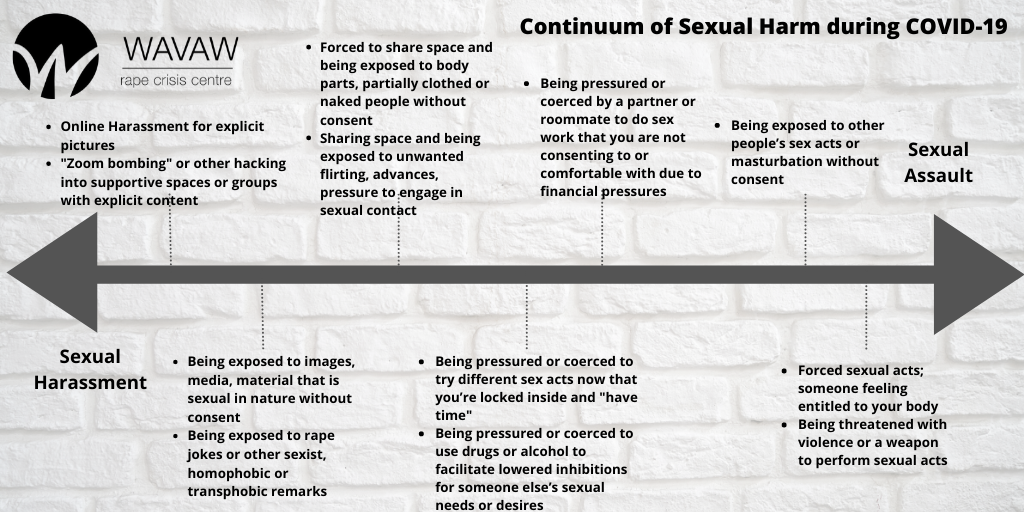We are here for you during Covid-19
Over the past several weeks, life has continued to evolve under this new reality and we have continued to see new and emerging ways that our lives need to change in order to “flatten the curve” and maintain “physical distancing”. We are being told to stay connected while apart and to stay home as much as possible. Some of us are additionally facing quarantine if we are not feeling well or have arrived back in Canada from traveling abroad. These stipulations are vital in our collective fight against this virus, but we also know that not everyone experiences life and the world in the same way.
At WAVAW, we often talk about the potential harms involved in taking a “cookie-cutter” approach to service delivery and feel deeply that we must be able to meet each survivor we serve at the intersections of their realities and lived experience. This is especially on our minds now, as we are all being asked to do the same thing: stay inside, stay home and use technology to work and connect with loved ones. This virus and the fight against it will not impact all of us equally, just as the intersections of our identities will affect how we experience the continuation of rape culture and sexual violence.
We are hyper-aware that for survivors of sexualized violence, dealing with isolation can exacerbate trauma responses, and can increase anxiety and depression. We always say sexual violence is an isolating experience, not an isolated one and in these times the feelings of disconnection and isolation are real. We want to also acknowledge that survivors may be in settings, living arrangements, and homes with people that are unsafe. This may mean co-habiting with people who are unsupportive, who may not understand our trauma responses, who may be incentive to our triggers, or who cause/have caused us harm. For some survivors, these times of isolation may also mean suppressing gender identities or the inability to live authentically. It is vital for folks to be able to reach out and care for themselves, it is also important to check-in on survivors in our lives and provide support and care for each other.
We want to remind you that we are here 24 hours a day to respond to your call.
We also know that just because many of us are not accessing the world in the same way as we usually do, this doesn’t mean the realities of “Rape Culture” cease to exist or directly impact our lives. We know that during this time we can all feel powerless and lacking control over our realities. This can be a breeding ground for those that are intending to cause harm or exploit others to meet their own needs or try to regain some semblance of power by exerting power over others.
What we know about sexualized and gender-based violence is that it is a power-based crime. This in turn means that in times when powerlessness is being exacerbated – and particularly during pandemics and disasters – there will be an increase in violence against marginalized genders and other vulnerable communities. We must remember that 80% of sexual violence is perpetrated by people we know or trust, or by people who have access to us; this becomes even more important to recognize in times where we are possibly confined to a space with those very people.
Whether we are considering our own experience or are responding to loved ones or survivors who are reaching out during this time, it is important that we remember that sexual harm occurs on a continuum. To unpack the nuances of sexually harmful and violent behaviours that we may be seeing or experiencing, we have created the continuum of sexual harm during COVID-19.

The intention of the continuum is to illustrate the wide range of sexually harmful behaviours and to resist simplifying what sexual violence may look like during this pandemic, rather than to cover all possible scenarios or forms of sexual violence. We know that as we navigate living in “Rape Culture” during this pandemic that we can also be made to feel as though our experiences, feelings and triggers are not valid or we are overreacting. Not all sexual violence is the same. Each of us has a unique response to what we have experienced in the past and/or continue to experience. All of our responses are valid and true.
While we are cognizant that more feelings of heaviness are difficult to sit with right now, we want to be here to continue to validate survivor’s experiences and speak truth to the ways in which patriarchy, white supremacy, colonization, sexism, homophobia, transphobia and transmisogyny, and poverty will influence the continuum of sexual harm and violence that will play out on our lives under this current situation of COVID-19. We must recognize that the pandemic of sexual violence and gender-based violence has long been a reality for people of marginalized genders prior to the current one that is asking for our full attention.
Please know that we are here 24 hours a day to support you and connect you with resources in the community. Call us any time at 604-255-6628. We cannot heal in isolation. Please stay connected.
- On April 2, 2020

